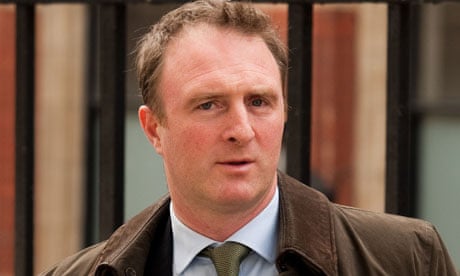The editor of the Times has apologised to a high court judge over the paper's failure to declare that a reporter had hacked into the email of an anonymous police blogger when it fought an injunction sought by the officer.
James Harding told the Leveson inquiry on Tuesday he "sorely regrets" that the newspaper did not disclose this information and said he has written to Mr Justice Eady, the high court judge who presided over the 2009 injunction application, to apologise.
Harding gave the fullest account yet to the inquiry of the circumstances surrounding the incident in 2009, when a reporter hacked into the email account of Richard Horton, a Lancashire police detective constable who blogged under the name NightJack.
He confirmed to the inquiry that the reporter responsible was Patrick Foster, who was subsequently dismissed from the Times following an unrelated incident. Since leaving the Times, Foster has written as a freelance for the Guardian and Daily Telegraph.
Horton lost his bid to remain anonymous in June 2009 after the Times successfully argued against his high court application for an injunction on the grounds that it was in the public interest to identify him. However, the Times did not disclose to the court that the reporter had told his managers before publication that he had hacked into Horton's emails.
Harding, returning to make his second witness appearance at the inquiry on Tuesday, also apologised to the officer, saying he "sorely regrets the intrusion into Richard Horton's account by a journalist then in our newsroom".
"I am sure Mr Horton and many other people expect better of the Times and so do I. So, on behalf of the paper, I apologise," he told Lord Justice Leveson.
Harding said he regretted that the paper did not launch a full investigation into exactly what happened in 2009, blaming the paper's legal manager for the decision to fight the blogger's bid to keep his identity secret.
Harding said the lawyer, Alastair Brett, knew when the paper began to contest the injunction application that Foster had hacked into the policeman's email, but decided not to disclose it to the court.
The inquiry was shown a series of internal emails which showed that several senior Times editorial managers were aware that Foster had hacked Horton's email in early June 2009. The paper published its story revealing that Horton was the police officer behind the NightJack blog on 17 June.
In one email Foster asked for more time on the story, to put a "little space between the dirty deed and publishing" the article that unmasked the blogger.
Harding said he was kept in the dark by Brett and accused him of making the decision to fight the blogger's bid for an injunction without discussing it beforehand with him, the deputy editor or the managing editor. "I had no idea the case had been brought to court," Harding told Leveson.
He added that Brett still does not think he misled the court and had good legal reason for not disclosing the email hacking.
"I hope you realise that that it is very unusual. I've never heard of a case where the legal manager takes the case to a high court without informing the editor, the deputy editor or managing editor," Harding told the inquiry.
He said he was not aware at the time of the exact nature of the hacking but felt the intrusion was inappropriate and Foster was disciplined immediately.
Harding said he first came to hear about Times managers' concerns about the email hacking on 5 June 2009, when the paper's then managing editor David Chappell raised the matter with him at a meeting.
He had been copied in on an email from Brett to Chappell the night before but it was lengthy email and he did not read it. At the time, there was an attempt to oust prime minister Gordon Brown and his mind was elsewhere, he told Leveson.
"Mr Brett was a very experienced legal manager. I was deeply frustrated that he had not consulted with me on the decision to take legal action," said Harding.
He added that he was not informed of the "instruction to counsel", any communication with Horton's lawyers or the decision as to what material was put before the high court. "Mr Brett took the decision to resist the injunction," he said.
Harding said he understood that Brett told Foster "that if he wanted to publish a story about NightJack's identity" he would have to identify him through legal means" which he proceeded to do.
He also said that in the last week Brett, who left the Times in July 2010 over an unrelated matter, has been in touch with News International's law firm Linklaters. Harding added that he understood Brett told Linklaters he decided not to inform the Times counsel at the time or the court about the issue "because he took the view that the information provided to him" was "confidential and privileged" and that it would "incriminate" Foster.
"I understand that Mr Brett told Linklaters that he did not believe at the time, and still does not believe, that the decision he took resulted in the court being misled," he said.
The counsel for the inquiry, Robert Jay QC, branded the explanation from the Times lawyers as "wholly misleading". "Statements of fact were being put before the court which were incorrect, weren't they?" he asked Harding.
Harding agreed when Jay put it to him that it was "not correct" when counsel for the Times argued at the high court that Foster had identified the blogger by "self-starting journalistic endeavour", or that he had pieced his name together through a combination of "publicly available materials, patience and simple deduction" .
To contact the MediaGuardian news desk email editor@mediatheguardian.com or phone 020 3353 3857. For all other inquiries please call the main Guardian switchboard on 020 3353 2000. If you are writing a comment for publication, please mark clearly "for publication".
